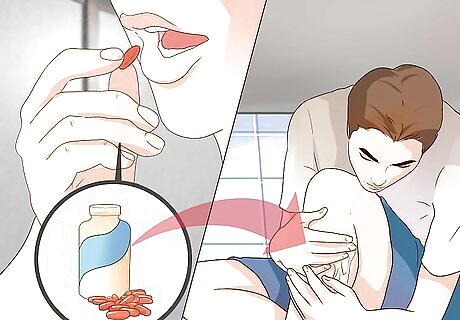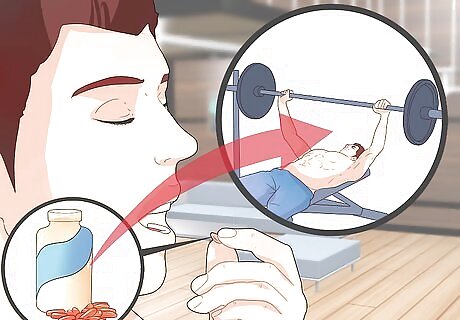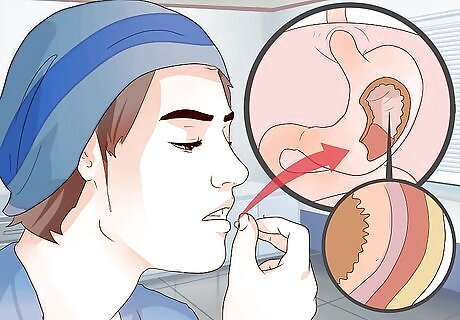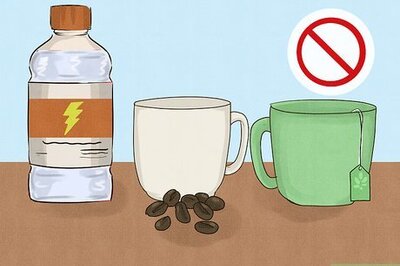
views
X
Research source
Experts think that taking a glutamine supplement may be helpful, so you might want to incorporate it into your diet.[2]
X
Trustworthy Source
PubMed Central
Journal archive from the U.S. National Institutes of Health
Go to source
Before you take a supplement, check with your doctor to make sure it's right for you.
Understanding Glutamine

Educate yourself about glutamine. Glutamine is an amino acid produced in your body. Amino acids are building blocks of protein which are important for regulating cell growth and function. In particular, glutamine helps remove waste, also known as ammonia, from the body. It also helps your immune and digestive system. Within the body, glutamine is stored in your muscles and lungs.

Find natural sources of glutamine. Your body generally gets the majority of its glutamine by producing the substance itself and through your daily intake of food. However, when your body is under stress, you suffer an injury, or you have an infection, your body may not be able to produce enough. When this happens, there are two ways to get additional glutamine: through food or supplements. You can get it naturally by supplementing your diet with an increase of glutamine-rich foods. Glutamine is naturally found in high protein foods such as dairy, fish, meat, beans. It can also be found in vegetables like spinach, cabbage, and parsley. Although these foods provide glutamine, they do not provide as much as supplements do.

Ask your doctor about glutamine supplements. If you cannot get enough glutamine through your food, or if you need additional glutamine because of increased stress on your body, ask your doctor about the supplement. The dosages and type you should take can vary greatly depending on what condition for which you are being treated. Your doctor can tell you whether this form of treatment is worth pursuing and can advise you on what quantity of glutamine to take. Generally, the dosage of the supplement used is 5g to 10g daily, which is usually given in three divided doses a day. However, the doctor may tell you to take up to 14g. People with medical conditions that may affect excretion of glutamine, such as people with kidney or liver disease, should always ask their doctor before beginning any new supplements. Glutamine supplements are used for many different issues, however not all of them have strong studies behind them.

Consider different forms of supplements. Although you should ask your doctor about supplements, they are generally available over the counter in pharmacies and health food stores. They usually come as L-glutamine and may be part of a protein supplement. The supplement should state if it is naturally derived or synthetic. A lot of supplements seem to be derived from plant sources so they are vegetarian, but you should always check the label. Glutamine is available as capsules, a powder, a liquid, and as tablets. The powder and liquid form may be better for those who have trouble swallowing or are using the supplement for stomatitis.

Take the supplement appropriately. There are certain rules you need to follow when taking glutamine. It can be taken with or without meals, but make sure you do not take it with food or drinks that are hot. This is because glutamine is an amino acid which can be affected by temperature. Glutamine should only be taken with cold or room temperature liquids. Glutamine powder or liquid can be mixed with water or juice with a low level of acidity like apple or carrot juice. Taking glutamine with acidic juices (like orange or grapefruit juice) or hot liquids will degrade the glutamate and therefore diminish any benefits.

Know side effects and warnings. As glutamine is naturally occurring in the body, it rarely produces any adverse side effects. However, excessive glutamine consumption should be avoided as it can lead to an upset stomach. You should also consult with your doctor before taking glutamine if you have liver or kidney disease, or if you're pregnant or breastfeeding. It may be necessary to decrease your dosage or stop taking glutamine altogether. It is generally recommend to avoid very high doses of any supplement, including glutamine, unless prescribed by your doctor for specific conditions Be aware that glutamine is completely different from glutamate, glutamic acid, monosodium glutamate, and gluten. Therefore, people suffering from gluten intolerance do not need to worry about having an adverse reaction to glutamine. However, in some rare cases, people will experience a bad reaction to glutamine. Symptoms include stomach pain, vomiting, headache, sweating, and joint pain. If this is the case, you should stop taking glutamine immediately and consult your physician.
Using Glutamine for Specific Situations

Use glutamine for wound healing. Supplements are often used to support people who have gone through the stress of a wound. Cortisol, which is a hormone released when the body is stressed due to injury, burns, and infections, causes a decrease in glutamine. Some studies suggest that glutamine supplements help your immune system, which helps you fight against the adverse effects of wounds. Glutamine also helps reduce infections. The innate muscle recovery properties of glutamine also make it extremely effective with patients who have suffered from burns or undergo surgeries.

Take glutamine for bodybuilding. Glutamine is a popular bodybuilding supplement. Just like when the body goes through stress due to injury, your body goes through stress when you build muscle. There is a short-term break down of muscle, and glutamine along with other amino acids are the building blocks of the new muscle that will be built post work out. The common thought is that it helps recharge and strengthen muscles that are overly taxed by exhaustive exercise. Although this is a popular method, there have been no conclusive studies with evidence for its use in bodybuilding.

Increase low levels due to cancer. Patients with cancer often have low levels of glutamine as well as other macro- and micronutrients. Due to this deficiency, research is being done as to how glutamine supplementation may help cancer patients. Currently, it is used for malnourished patients who are going through treatment as well as for patients receiving bone marrow transplants. Some studies indicate it may help with stomatitis, which is an inflammation of the mucosa of the mouth, and diarrhea associated with chemotherapy.

Treat other issues. There are a few other conditions that researchers believe are helped by glutamine. Inflammatory bowel disease (IBD), which includes ulcerative colitis and Crohn's disease, may be helped by glutamine supplements. This is because glutamine plays a role in protecting the mucosa, which is the lining of GI tract. Take one 5g tablet, six times a day by mouth for up to 16 weeks. The amount of time for this dosage is limited because it is a much higher dosage than normal. Although there is some evidence that glutamine helps with diarrhea and inflammation of mucosa near the mouth, studies have not yet shown that it helps with other digestive conditions such as Crohn's disease. Glutamine may also be helpful in promoting weight gain in patients with HIV/AIDS. A few studies indicate that glutamine, in addition to other supplements, may lead to weight gain and an increase in muscle mass. This is helpful since patients with HIV/AIDS often suffer severe weight and muscle loss. In addition, it may help these patients absorb nutrients better, which is a consideration with this condition.




















Comments
0 comment